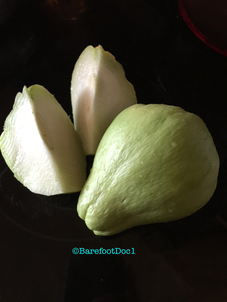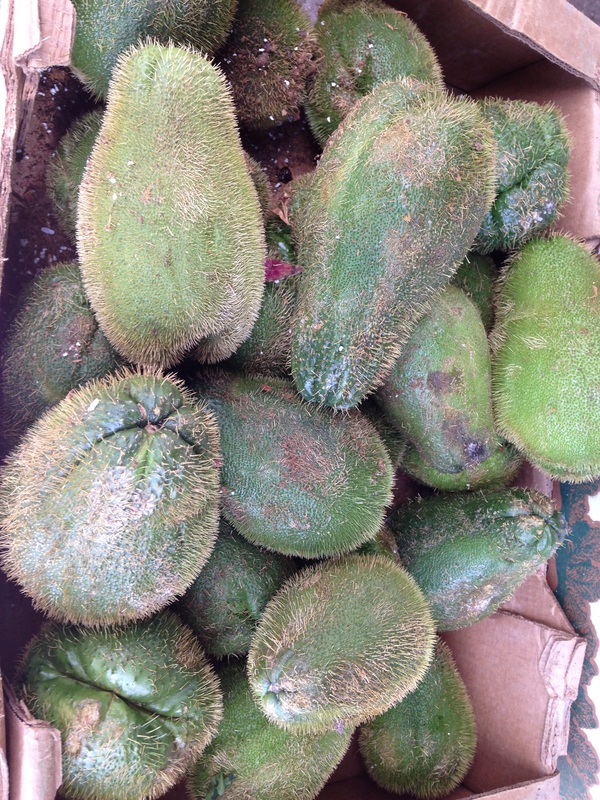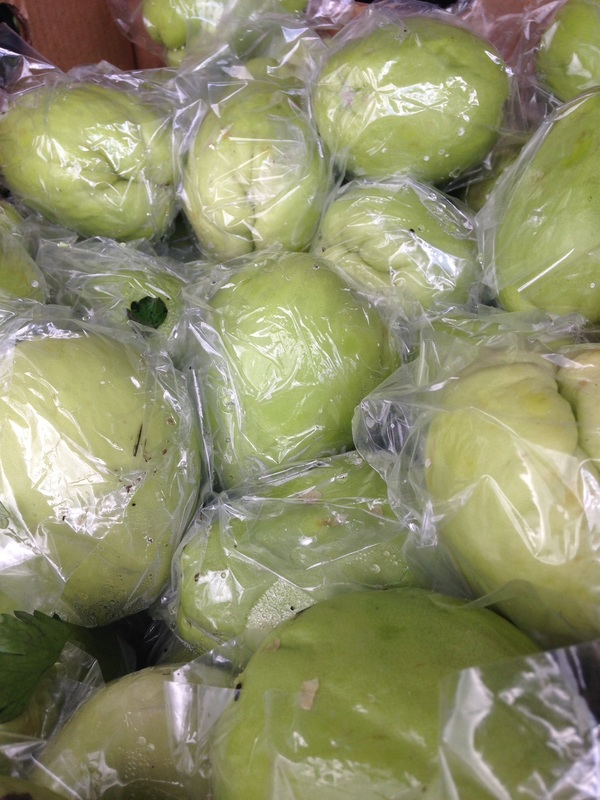 Chomping on a Chayote
Chomping on a Chayote Nutritional Benefits:
◦ Chayote has a high water content & great diuretic properties so it works well with detox/cleansing diets or to assist with weight loss (low in calories and high in fiber).
◦ Rich in copper, potassium, zinc, magnesium, folate & other vitamins/minerals so beneficial in fertility issues, cancer prevention, and bone, muscle & nerve health.
◦ Loaded with amino acids (building blocks of proteins).
Recipes:
◦ Shred as you would cabbage & include in your slaw recipes
◦ Boil (the skin of the smooth-skinned variety is edible) & eat as a vegetable
◦ Add to your smoothies (include the flat inner ‘seed’ as they are loaded with protein!)
◦ Bake as is or stuff as you would a winter squash
◦ Cube/slice and cook in your favorite Indian, Thai, Vietnamese or Caribbean sauce or stew (thanks Mum, for the recipes ;-D)
Medicinal Uses:
The entire plant can be used for its healing benefits including anti-oxidant and anti-inflammatory properties such as:
◦ Fruit itself used to treat urinary tract problems such as kidney stones, cystitis, nephritis.
◦ Leaves: infusion of the dried leaves can help treat arteriosclerosis & high blood pressure as well as colds or bronchitis.
◦ Use the juice of the fruit to bleach freckles or skin blemishes.
◦ Apply the flesh as a poultice on inflammations and wounds.
◦ Research studies showed extracts of Chayote had great antibacterial (inhibit Gram negative bacteria) antifungal (2 yeasts: Cryptococcus neoformans and Issatchenkia orientalis had sensitivity to its extracts) and antimicrobial properties (Chayote’s extract & tincture had very good antimicrobial efficacy against all strains of multi-resistant Staphylococci and Enterococci) *Source: See reference below.
And there ya have it! Although the chayote is not a weed, I had to include it here because I unfortunately see too many people who turn their noses up at foods that are unfamiliar to them or outside of their culture. Be open to the wonderful world of all of God’s creations. Next time you’re at the produce stand, keep an eye out for this healthy addition to your family meals – your body & your taste buds will love you for it.
Until next time, Happy weed’n, Happy eating, Happy healing!
Audrey Steele, L.Ac.
Acupuncture Physician
References:
- Noumedem, Jaurès AK et al. (2013). “Antibacterial activities of the methanol extracts of ten Cameroonian vegetables against Gram-negative multidrug-resistant bacteria”. BMC Complementary and Alternative Medicine, 13:26.
- Ordoñez, A.A. L. et al. (2003). “Antimicrobial Activity of Nine Extracts of Sechium edule”. Microbial Ecology in Health and Disease, 15(1): 33-39.
- Dire, G.F. et al. (2010). Comparative Analysis of the Biological Effects Related to a Natural Extract Processed from the Bark of Chayote (Sechium Edule). Global Veterinaria 4 (3): 225-229.
- Pei Shing, Gwee, et al. (2013). “Antifungal and antibacterial properties of three medicinal plants from Malaysia”. Pharmacognosy Communications, 3(2): 75-81.
- Gordon, E.A. et al. (2000). “The Anti-Hypertensive Effects of the Jamaican Cho-Cho/Sechium Edule”. West Indian Med Journal. 49(1):27-31



 RSS Feed
RSS Feed
